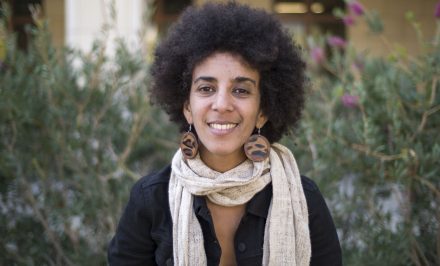 Côte d’Ivoire: Patricia Claude Kalou, passion and commitment to audiovisual and cinéma
Côte d’Ivoire: Patricia Claude Kalou, passion and commitment to audiovisual and cinéma
 Felicia Nja-Njobaya Motia, the young leader championing regenerative agriculture in Cameroon
Felicia Nja-Njobaya Motia, the young leader championing regenerative agriculture in Cameroon
 Laure Beyala, the Franco-Cameroonian engineer promoting digital health
Laure Beyala, the Franco-Cameroonian engineer promoting digital health
 Rapelang Rabana, the computer scientist who wants to revolutionise learning in South Africa
Rapelang Rabana, the computer scientist who wants to revolutionise learning in South Africa


Timnit Gebru specializes in the ethics of artificial intelligence. She is committed to tackling biases in facial recognition algorithms that are not suitable for people of African descent. In 2022, Time magazine named her one of the most influential people of the year.
Through her scientific articles and initiatives, the Eritrean researcher has become one of the leading figures in the fight against the biases of facial recognition algorithms that are more suitable for people of white colour. At the same time, she is advocating for more representation of people of African descent in the field of African intelligence.
It was following a personal incident that this Eritrean woman, who had been granted asylum in the United States a few years earlier following the instability in her country, decided to take an interest in ethics in technology, focusing in particular on facial recognition. One evening, one of her friends was attacked in a bar. She hurried to contact the police to report it. Instead of filing a complaint, her friend was finally arrested and placed in pre-trial detention. A situation due to the issue of facial recognition system that could not identify people of African descent.
In 2001, she was admitted to Stanford University where she received a Bachelor of Science and Master of Science in Electrical Engineering and a PhD in 2017.
Promoting greater representation of people of African descent in artificial intelligence
In 2015, she participated in the Neural Information Processing Systems, one of the most important conferences in the field of artificial intelligence. During the meeting, which was held in Montreal, Canada, she realised that out of the 3700 participants, there were barely 5 people of African descent, including one woman, her. The following year, the same thing happened. She then founded “Black in AI” with another Ethiopian researcher, which brings together researchers of African descent working in the field of artificial intelligence.
A career to fight algorithmic bias
From 2004 to 2013, she worked at Apple as an audio engineer and was particularly interested in creating software to recognise human faces. She even developed signal algorithms for the first iPad.
In 2017, she joined Microsoft as a post-doctoral researcher in the FATE Lab (Fairness, Accountability, Transparency and Ethics in AI) dedicated to equality, transparency and ethics in artificial intelligence. While at Microsoft, she published a paper with researcher Joy Buolamwini entitled “Gender Shades” which showed that women of African descent were 35% less likely to be identified by facial recognition algorithms than white men.
In 2018, she joined Google where she co-led a team on the ethics of artificial intelligence. In 2020, she co-authored a paper with 5 other authors entitled “On the dangers of Stochastic parrots: can language models be too big”. A study that provoked several controversies and led shortly after to her dismissal.
In December 2021, she founded the Distributed Artificial Intelligence Research institute (DAIR) to fight algorithmic bias in technology.
Because of her work, she has received several awards. She has been named one of the world’s 50 greatest leaders by fortune magazine and one of the 10 most influential people in science by the British science journal Nature.